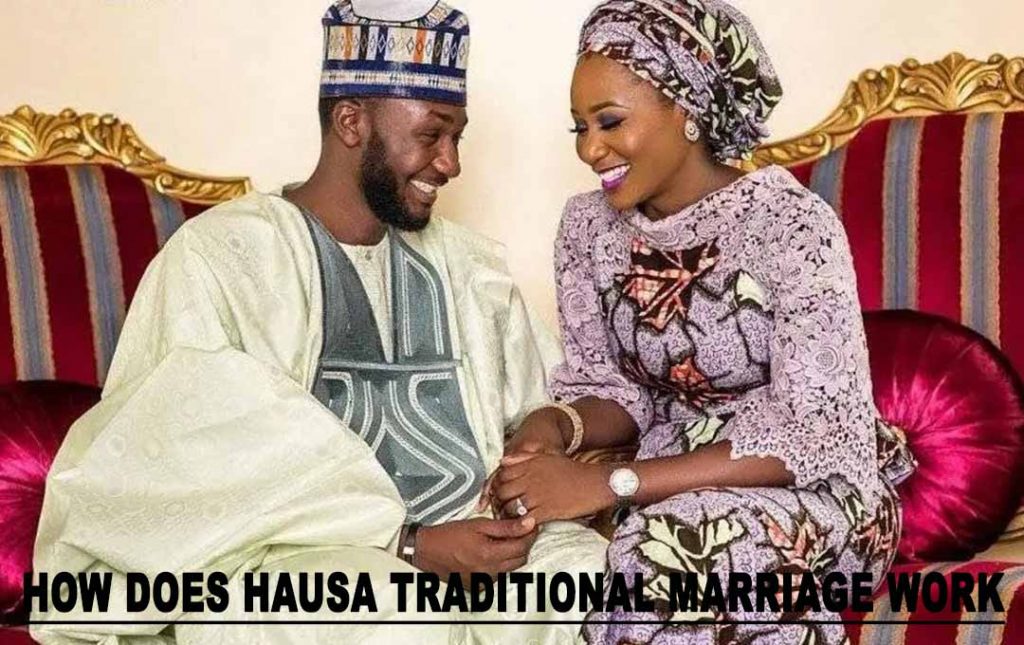The Hausa people, one of Nigeria’s largest ethnic groups, have a rich cultural heritage that is in their traditional marriage ceremonies and more. In this article, we will explain how Hausa traditional marriage works, explore its components, pre-wedding ceremonies, and frequently asked questions.

How Does Hausa Traditional Marriage Work
Hausa traditional weddings are vibrant and colorful ceremonies, encompassing various rituals and customs that have been passed down through generations. In Hausa tradition, a man asks for his parents’ consent when he finds a woman he loves, and wants to marry. After he has gotten his parent’s consent, the other marital rites can now take place.
Hausa Traditional Marriage Process
Here is how the whole process works:
- A formal introduction of the groom and his family to the bride’s family takes place. The groom’s family brings gifts and meets with the bride’s parents to seek their consent for the marriage.
- Both families exchange gifts as a sign of acceptance and commitment.
- If both families agree, the prospective bride and groom are to obtain their consent and ensure their willingness to enter the marriage.
- Once they get consent, negotiations for the bride price (Sadaki) begin. The groom’s family and the bride’s family discuss to determine the items, gifts, or monetary value to get as part of the bride price. The bride price is usually a low amount, as it is believed that the lower the amount, the more blessing from Allah.
About Hausa Traditional Marriage
- They pay the bride prize on the wedding day (Fatihah) by the groom’s family. In paying the bride prize, the bride will receive jewelry, perfume, and Henna (Lalei).
- The Walima is the grand wedding reception. It is a festive celebration where family, friends, and well-wishers gather to rejoice in the union of the couple. The Walima features traditional music, dance performances, and elaborate feasts.
- The Kai Amarya ceremony involves the bride leaving her parent’s home and to her new home with the groom’s family. It symbolizes the bride’s transition into married life and her acceptance into her husband’s family.
Conclusion
People know Hausa traditional marriages for their colorful and joyful celebrations. Each ceremony holds deep cultural significance and serves to unite families and communities.
FAQ
How do they pay the Bride prize in Hausa Land?
The bride price usually starts from a minimum amount known as Rubu Dinar, to the highest amount the groom can pay.
What is the significance of Henna in a Hausa traditional wedding?
Henna holds cultural and symbolic importance in a Hausa wedding. The bride’s hands and feet are on henna during pre-wedding ceremonies as a sign of beauty and good luck.
Are Hausa traditional weddings religious ceremonies?
Yes, Hausa traditional weddings often incorporate Islamic customs and rituals, as the majority of Hausa people are Muslim. Islamic prayers and blessings are an integral part of the wedding ceremony.
Can non-Hausa individuals participate in a Hausa traditional wedding?
Yes, Hausa traditional weddings are often inclusive, and non-Hausa individuals can participate and witness the celebrations. However, it is respectful to familiarize oneself with the customs beforehand.
Check Out:
- How does Igbo Traditional Marriage Work | All You Need to Know
- How does Yoruba Traditional Marriage Work | All You Need to Know




Wow I must first say a big kudos to you for this excellent writeup article about Hausa wedding tradition you must be a professional to put up this.
I see Beautiful and perfect Styles you have in this your blog to rock or slay to occasions,there have never being a dull moment from you and you deserve an award for this, Keep it up, kudos.